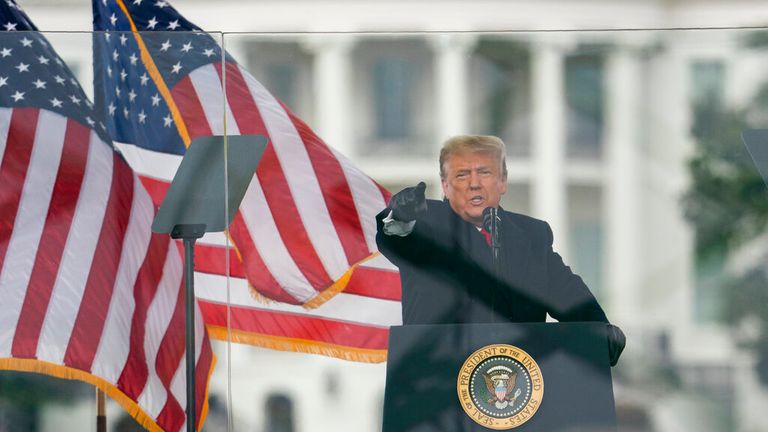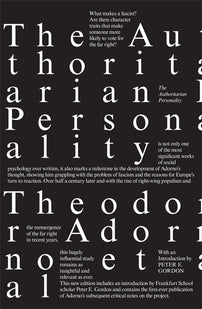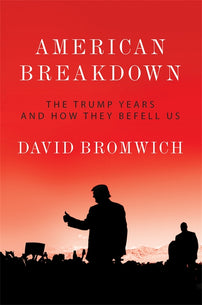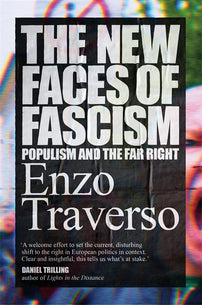Scapegoating Trump: Reflections on the Question of Fascism in America
Peter E. Gordon questions what really caused the anti-democratic assault on the Capitol and whether we should call the President a fascist.

The victory of Joseph R. Biden in the 2020 Presidential elections will no doubt bring a measure of relief to all of us who have watched in horror as the current occupant of the White House strained the institution of American democracy nearly to the breaking point. In centres of liberal opinion such as Cambridge, Massachusetts, crowds gathered in early November to cheer and wave as passing cars honked their horns. It was a festival born of the comforting belief that the spell of a would-be tyrant had finally been broken and the country could now be restored to what it once was. That very night, the President-Elect gave a live address in which he offered the usual platitudes and promises. “We are not enemies.” he said. “We are Americans.” He even quoted the line from Ecclesiastes that there is “a time to reap and a time to sow.” He didn’t mention the other bit about “a time to hate.”
But hate was on grand display in Washington D.C. throughout the afternoon of January 6, 2021, when a crowd of thousands gathered for a “Save the America” demonstration, listened to the President rage against the humiliating experience of his political loss in what he called a stolen election. They took special note of his final exhortation:
“So we’re going to, we’re going to walk down Pennsylvania Avenue, I love Pennsylvania Avenue, and we’re going to the Capitol and we’re going to try and give… […] we’re going to try and give our Republicans, the weak ones, because the strong ones don’t need any of our help, we’re going to try and give them the kind of pride and boldness that they need to take back our country.”
And then all hell broke loose, with results that were, or should have been, entirely predictable. A violent mob broke into the Capitol building, shattered glass and burst through doors, terrorized Senators and their staff, and, brandishing their signs and their flags, succeeded in halting the official ratification of votes that is typically an unexceptional and routine process in the American democratic system. The usual inhabitants of the building cowered beneath benches and behind locked doors. The Vice President and other officials were swiftly escorted from the building. President Trump himself, despite his promise of that “we” would go to the Capitol, did not in fact accompany the crowd whose passions he had helped to stir into action. Instead, he watched the events unfold on television from a safe distance, and it’s been reported that he was in a state of excitement, qualified only by his dismay that elements of the mob appeared “low class.”
The violence of these events is so recent and so raw that all attempts to summarize their meaning will inevitably be premature. But I want to offer just a few reflections on what it may portend for the immediate future.
*
In the best-case but unlikely scenario, the coming months could bring waves of contrition. When the right-wing commentariat loses its interest in rumours of a stolen election, a new narrative may emerge, and the overwhelming share of Republican politicians who spent the last four years transforming themselves into Trump’s enablers could slowly break away from their cult-like leader to say that they did not really mean it after all, that in their hearts they always harboured reservations about the President and are glad to see him go. Perhaps they will joined by moderates in the Democratic party to forge a new consensus, that Donald Trump was a mere anomaly whose dismissal now offers us a chance to forget all that unpleasantness and, in Biden’s words, “to restore the soul of America.”
But all of this is an illusion, and, if we reckon honestly with what has happened, we have little reason for confidence in the survival of American democracy. My own political views are far to the left of the average American, and I see in Biden’s victory little more than a restoration, not the harbinger of political redemption. As I write these lines on an early Sunday morning in 2021 several weeks after the election, the final tally shows that Trump received well more than 74 million votes—and that’s the second largest share of votes ever won by a President in all of US history, after Biden of course. This is hardly a cause for celebration. When it came to a choice between a hate-mongering demagogue and a principled if occasionally faltering moderate, nearly half of American voters went for the demagogue.
With numbers like this, the hopeful idea that Trump was somehow repudiated must be set aside as a liberal myth. But, even if he had been repudiated, what then? Trump was never the cause of the trouble, he was only an accelerant. Four years of Trump’s presidency helped to expose the hatred and intolerance and violence that has coursed through our society since its founding. In 2018 the Southern Poverty Law Center reported that the number of hate groups operating in the US rose to a record high—more than a thousand—with a corresponding increase in hate crimes as documented by the FBI. No single individual can be held responsible for such statistics, and what they reveal about the US is that, no matter who is President or which party is in power, broad trends of American political culture point toward increasing fracture.
In 2018, two Harvard colleagues, the political scientists Steven Levitsky and Daniel Ziblatt, published a book with the title, How Democracies Die. They argued that, when we compare the US to other nations around the globe, we are reminded that American exceptionalism is a myth. Our system “is vulnerable to the same pathologies that have killed democracy elsewhere.” Part of the problem, they argue, is norm erosion. Any stable democracy has ground-rules, and while some rules are stated in the constitution, others are secured by little more than convention or tacit agreement. If those ground rules are tested often enough the public can start doubting why they matter at all. Political analysts sometimes describe this as a movement of the “Overton Window.” Proposals that once seemed unthinkable or taboo gradually enter the domain of acceptable debate, and, even if those plans are not adopted as official policy, they slowly redefine the range of acceptable opinion. Over the past four years, Trumpism has shifted the horizon of possibility, and today the Overton window has lurched so far to the right that it threatens the integrity of a load-bearing wall.
The edifice of democracy is fragile; unlike totalitarianism or tyranny, it requires the broad consent of its members. It is, one might say, a structure without foundations, and it works only if we are committed to its working. In 2017, Ziblatt published a book, Conservative Parties and the Birth of Democracy, in which he examined the transformation of political conservativism over the last two hundred years. Democracies, he explains, first gained their balance only because conservative elites surrendered their yearning for authoritarian rule and committed themselves to the uncertain game of democratic self-governance. But this commitment has always been conditional and it can be rescinded at any time. In the twentieth century, many on the right withdrew their support from democratic institutions and opted for a solution that burst the constraints of any constitutional order.
Today, there are signs that this commitment is once again losing its hold. A growing number of Americans and their representatives are no longer feel much faith in the basic rules of democratic process and are quick to challenge those rules if the process does not yield the results they wish. In the last months before the election, President Trump repeatedly raised the suspicion that the election would be fraudulent and refused to say that he would accept the results if he were to lose. Virtually no elected official in the GOP spoke out to defend the system against these assaults. More worrisome still was the silence of the Republican establishment when the Trump refused to condemn racist and white-supremacist groups who rallied to his side. It was bad enough when he said after the murderous demonstrations in Charlottesville that there had been good people “on both sides.” During the first Presidential debate with Biden, he went even further, instructing a faction on the radical right to “stand by.” A President who expressed such contempt for the rules and norms of democracy should have been roundly condemned, not just by his opponents but by all members of the polity. But he was not condemned; he was worshipped like a saviour, and was even assigned a redeeming role in the exotic theologies of the evangelical right.
What Trump might do when he no longer feels the constraints of the office is anyone’s guess. Maybe he’ll join his friends at Fox News as a conspiracy-mongering commentator, maybe he’ll launch a media empire of his own, or maybe he’ll go back to his career on reality-television (the very word is a contradiction in terms) and start doing what he does best: firing people. The last four years will look as if they were little more than an extended infomercial to boost his ratings. But what chicanery Trump may prefer is ultimately of little import, since speculation about Trump as the individual has never been much more than gossip. Trump, after all, the man himself, was always unimpressive—an Emperor without clothes who was somehow given the keys to the Empire. For his enablers, of course, he is blessed with an unlikely charisma, and it seems likely that at least the hard-core militants in his base will continue to follow his all-caps ejaculations on whatever social media platform will still tolerate his account. And they will worship him as a President-in-exile, as if he were de Gaulle fanning the embers of the resistance and biding his time for a theatrical coup.
As I write this, leaders of the Democratic party, joined by small handful of Republicans, are now seeking to unseat Trump during these very last days of his Presidency, either by invoking the constitutional amendment 25 that would declare him unfit for office, or, more likely, by impeaching him a second time. A second impeachment would be an historical first in American history, a humiliation that no other President has ever suffered. And if this restrains the President, if, for instance it keeps his fingers away from the so-called “Presidential football” with which he could launch nuclear weapons, then such efforts to remove him from office are entirely justified. But I will confess that I am nonetheless troubled by these efforts, since they can only assist the political establishment in scapegoating Trump and cleansing themselves of their own responsibility. Scapegoating, after all, is a remnant of magical belief, which, like all magic, works through misdirection, and only so long as you do not look where you should. The hapless goat, after all, is hardly to blame; it is only a convenient tactic of self-expiation, born of a fantasy that the collective can disburden itself of its sins by heaping them upon a single individual or group.
So, let’s say that he is removed from office, whether by an act of legislature or by the simple expiry-date of his Presidency when Biden takes his place. What will this have really accomplished? The hundreds of thousands if not millions of average Americans who thrilled to his every utterance will not disappear if he fades from the scene. It is more than likely that they will find a new demagogue, someone younger and less distracted and more skilled and all the more dangerous who can step into his shoes.
For the awful truth is that Donald J. Trump has always been a distraction, and the reality-show of his so-called Presidency has only reminded us of what we should have known all along. Democracy is precarious, and it can survive only if its citizens continue to believe in its value. The true danger now is that this belief has not just started to fray, it has been fraying for a very long time. If the current trends continue, there is no guarantee—and no mythic blessing of American exceptionalism— can that prevent this country from devolving into the same authoritarianism that is now consuming so many democracies around the globe.
*
What is causing this anti-democratic wave?
A commonplace answer, one often preferred by critics on the left, is that it is due chiefly to deformations of rampant capitalism, or, more precisely, the deregulatory schemes of neo-liberalism, which since the 1980s have decimated the working-class, frozen real wages, and dramatically widened the gap between rich and poor, transferring the greater portion of wealth to those who are already rich. Democracies survive only when average citizens feel some stake in the broader society. When neo-liberal policies dismantled the social networks that nourished that feeling of safety and trust, the result was backlash, a hardening of embattled identity and a growing resentment against the elites who seemed responsible for the crisis. “Make America Great Again” became the angry slogan of economic and cultural grievance against a capitalism that had betrayed its promise.
This explanation is mostly right, but it cannot really answer a crucial question: why did this resentment sour into racist prejudice? The anger of a working class might have solidified into a new movement for socialist justice that embraced all Americans, whatever their colour or ethnic origin—but it did not. A self-described democratic socialist senator from Vermont tried this approach, and given the conservative temperament that pervades the United States, his success was remarkable. But, ultimately, it proved fleeting. For many Americans, the term “socialist” is simply too tainted, too freighted with traumatic meaning, and decades of red-baiting have made the revival of socialism in the States an unlikely prospect. Sections of the white working class, instead of embracing the revivified dream of a New Deal for all, permitted itself to be seduced by the nostalgic vision of an America the way it used to be.
But does this explanation really suffice? After all, the seduction of Trumpism worked well its magic beyond the ranks of its so-called “base,” it also took root among white suburbanites with college degrees who could hardly complain of financial distress. It is a popular misconception, among analysts on both the left and the right, that Trumpism was wholly explicable in economic terms and that it is chiefly a phenomenon of the white working class. But the average American with an annual income under 50 thousand dollars voted in a greater percentage for Biden, not Trump. According to the Associated Press, the gap was 54% to 45%. So why the misperception? For the obvious reason that, within that economic stratum, votes for Trump soar once you factor in race. And this means that race is playing a decisive role, even when Trumpist voters deny they are racist. Any explanation that omits the overwhelming significance of racial identity in Trumpism is ignoring a factor so obvious that the ignorance appears willfully obtuse. Denying that racism exists is the very essence of racism. To explain Trumpism, you have to grant the power of economic explanations but also reach beyond them to broader and deep-rooted patterns in American political culture.
In Heart of Darkness, the novelist Joseph Conrad said of his demonic protagonist that “All of Europe contributed to the making of Kurtz.” The brutality of European imperialism as portrayed in Konrad’s novel was not the product of a single man but a syndrome born from centuries of violence and greed and hatred. No less is true of the politics here. For all of the panic that it has aroused among a complacent and half-slumbering liberal citizenry, Trumpism was hardly unique; it was only the latest expression of the patterns that have coursed through American history since the beginning: The racism, the tribalism, the gun-loving swagger, the testosterone-pumped misogyny, the snake-oil fraudulence and the anti-intellectualism fobbed off as pious belief, the worship of money and the hatred of the weak, the fetish of a so-called “liberty” that actually means little more than placing one’s one narrow interests above the common good—none of this is really new. All of America contributed to the making of Trump.
*
So, what have we really learned? I fear we have learned little that could not have been known from the history of the radical-right political movements in the mid-twentieth-century. If Trumpism didn’t flower into full-scale fascism this was only because its aspirations were too uncoordinated, its leader too much a narcissist to devote himself with zeal to a cause greater than himself. Trumpism only pointed to fascism but never crystallized into a lock-step movement, despite the astonishing number of neo-fascists or so-called “Western chauvinists” who rallied to the cause. In the aftermath of January 6th we are coming to know more about these insurrectionists—and it seems that they were a loosely coordinated bunch, a motley crew of neo-Nazis and Proud Boys and QAnon conspiracy theorists and die-hard lovers of the racist Confederacy. Now I would guess that a fair number the people who stormed the Senate didn’t have a f*cking clue what they were doing. They were engaged in a kind of political theatre, decked out in various costumes that one imagines might have some kind of symbolism, though I’m utterly flummoxed as to what that symbolism was supposed to be. Some of their costumes were grimly amusing: one man looked like an absurd genetic cross between a Viking and a raccoon. As it happens, his costume was supposed to invoke some völkisch ideal, though this fact was wholly lost on me until a colleague kindly informed me of the fact. Some of them, however, seemed to have no better aim than taking selfies as they marched around the Senate offices or made off with podiums or other souvenirs of their misadventure.
None of this, of course, means that we should not take them seriously. Taking a photo of oneself as a testament to one’s participation in group action has been a commonplace ever since the camera became an apparatus that could be easily moved out of doors. Wartime photography dates back in time as least to the First World War if not before, and even in Abu Ghraib the prison guards took gruesome photos of their crimes and posed with smiles before the human bodies they had piled up behind them. Political theatre and political violence are not mutually exclusive, they go naturally together, because especially in a mass-media culture that violence is something enacted for the screen.
No doubt, the debate over whether to call the insurrection “fascist” will continue indefinitely without reaching a consensus. It is a mistake, however, to believe that fascism is only fascist when it succeeds, and that its aspirations should not alarm us if they are not decked out in the full-regalia of jackboots and swastikas. Nazism itself, as historians of fascism have often noted, was never a fully coherent ideology, and never reached its stated goal of full Gleichschaltung: it remained a polycracy, a series of overlapping and competing institutions, just as members of Hitler’s inner circle often found themselves “working toward the Führer,” trying to anticipate his aims without crystal-clear directives as to what he wished them to do. One prominent historian was even driven to conclude that Hitler was a “weak dictator.”
Still, Trump himself is no Hitler. He simply lacks the zeal and the selfless devotion to a cause. The problem, however, is that he has helped to awaken a slumbering passion. The people who follow him have a thirst for a movement, even if it’s a dull and barely articulate craving, a hatred that still lacks a determinate direction. They want power, they crave an authority that they feel once belonged by God-given right to people like them but has now been stolen—people who share their tastes and speak and dress like them and have the same colour of skin as they do. What’s fascist—if that’s the right word, though I have no special need to call it by that name—is this upsurge of inchoate anger that wants nothing more than both to destroy what they think is bullshit and to restore a greatness that they believe has been lost. Trump has given them a glimpse of what that might be like. But it’s little more than a glimpse. He has laid the groundwork, and he has primed the political culture for the emergence of something far more dangerous.
But the most important lesson is easily obscured, the lesson that the dangers are hardly new, and hardly unique to a single American President. And this brings me to the most crucial point.
Fascism is typically seen as an “extra-systemic” movement, one that arises within a democratic system but then seeks to destroy the system once it gains sufficient power. Trumpism did not reach this extra-systemic conclusion, and I rather doubt it ever had the unified will that would have been necessary. But fascism can also serve as a name for systemic features that are internal to democracy itself. The grim truth is that the conditions for something like fascism are far more banal, and rarely absent from the conditions we comfortably regard as “normal.” The violence and racism that is coursing through our culture has always been there, and it has always had the potential to turn into a more organized movement. In many respects it has been organized already, it’s just that it has rarely assumed the appearance of an anti-systemic assault. Instead, it has been a structural feature of the system itself; it’s built in to the circuits of normal American governance, the police brutality, the mass incarceration, the grotesque inequities in wealth and education. Call this what you will, but whatever we wish to call it, we should recognize that what’s happened today in the capital of the United States is not some kind of exception or departure from an otherwise flourishing democratic order. It’s merely another sign of the rot—the hatred and violence and intolerance and greed— that has been with us all along.
Yes, there was fanaticism on full display on January 6th. But the worst political movements of the modern era were due not to fanatics alone; democracies are brought down not by a small cadre of zealots but by the indifference of ordinary citizens who are hardly extremists but are mere conformists who give tacit approval to the excesses committed in their name. And this, I’m sorry to say, is why we can take scant comfort in the passing of 2020. Nor can we permit the Republican establishment and its so-called “centrist” representatives, who enabled the President for four years, to suddenly and too-conveniently don the garments of contrition and to condemn the leader they supported without restraint until the very last days of his Presidency, and only after it become crystal clear to them that there was no way they could plausibly contest his electoral defeat. The violent insurrection that unfolded in Washington on January 6th should have been expected, since its energies, subterranean but poisonous, had been in the making for decades. It was the consequence of a political culture that establishment politicians have willed into being, even if now they wish to scapegoat him and disburden themselves of their own responsibility for what they have wrought. The forces in American political culture that brought him to power are still with us, and they are sins that cannot be dispatched into the wilderness.
Peter E. Gordon is the Amabel B. James Professor at Harvard University, where he teaches history, philosophy, and European social thought. A specialist in Frankfurt School critical theory, he is the author of five books, most recently, Migrants in the Profane: Critical Theory and the Question of Secularization (2020). He also wrote a new introduction to Adorno et al, The Authoritarian Personality, which was recently republished by Verso (2019).
[book-strip index="1" style="display"]




